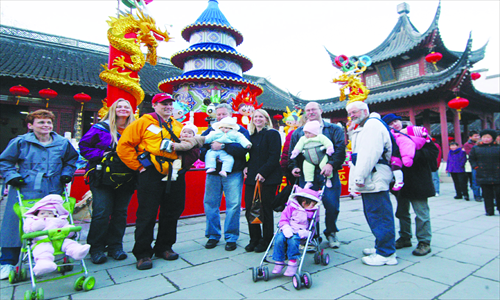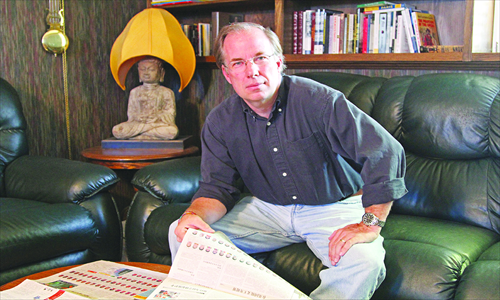By Zhang Yiqian

American parents tour Nanjing, Jiangsu Province with their adopted Chinese kids in 2006. Photo: CFP
When he was a single man well into his thirties, Brian H. Stuy, now 53 and married, had no control over when he would find the love of his life - but he knew then that he could do something to fill that paternal void inside of him.
Like many parents anxious to skip past years of waiting on adoption lists in the US, Los Angeles-born Stuy turned to a Chinese orphanage. From Dianbai, Guangdong Province in 1997, he brought home 8-month-old Meikina. She was a joy that filled his life with everything that he had hoped for, but he knew that she might one day wonder about her birth parents - so he decided he owed her the effort of trying to find them.
On a trip to China in 2000, when he was introduced to the woman who supposedly found Meikina, Stuy was eventually pained to learn that his daughter was the victim of a scam - she hadn't been found on the streets like her adoption papers said.
"Back when I adopted her, the woman who claimed to have found Meikina was able to describe the spot Meikina was found at, the clothes she was wearing and the basket she was in, but when she was interviewed by my wife in 2010, she couldn't remember a thing about it," he told the Global Times.
Stuy said he used to think that the China adoption program was a "beautiful thing," but that was before he knew what he knows now.
The revelation that many adopted Chinese children do not come from where adoption agencies or orphanages in China say they do was life-changing for Stuy. He has since devoted his days to finding out the truth about the Chinese children who are adopted by American parents - and even the search for Meikina's birth parents continues to this day.
His work materialized into Research China in 2003, a small business that he runs out of his Utah home, where he now resides with his Chinese wife, Lan, who he met in 2002, on one of his trips to China.
At the core of the business is Stuy's subscription-only blog (The Rest of the Story), which publishes information he and his wife - with the help of some dozen fixers in various pockets of China - uncover about children in China who are adopted by American parents.
Stuy also takes on specific cases at the request of American families, who want him to zero in on the family history of their Chinese child, a process that involves travel to China, recorded interviews at orphanages and the help of their fixers, who are based mainly in Guangxi Zhuang Autonomous Region and Guangdong Province, where hundreds of Chinese orphanages adopt kids out to American parents.

American Brian H. Stuy runs the website Research China. Photo: Courtesy of Brian H. Stuy
'Heartbreaking work'After marrying in 2004, Stuy and his wife together adopted a child from a Luoyang orphanage in China named Meilan. Like Meikina, Meilan was also later found to be tied to some adoption scam: Meilan's birth parents had been told that their daughter would return home after receiving education in the US.
The Chinese parents in Henan Province, who Stuy finally managed to track down in 2009, still believe the Stuys are her English teachers.
"When my wife met them, we didn't have the heart to break the sad news to them," he said, explaining that when 12-year-old Meilan finishes school it will be up to her to decide whether she stays in the US or goes back to China - but admitted the latter is unlikely as his "all-American-girl" has no interest right now in returning to meet her birth parents.
Stuy said that the harsh and devastating reality is that an alarming number of American parents have adopted Chinese kids who were obtained through illegitimate means. He believes that a majority of the some 25,000 cases he has looked into over the years, involving Chinese kids adopted mostly by American parents, were the result of some kind of adoption scandal.
But because it is so hard to track down the birth parents for many of these kids, he has only been able to prove that some dozen of the children were indeed passed to orphanages or adoption agencies in China by child-traffickers. And in each of these cases, none of the Chinese children have gone back to their birth parents - and learning the truth has been extremely hard on both the Chinese and American parents, said Stuy.
Yet Stuy said that the heartbreaking work needs to be done to give adopted kids the chance to learn the truth about themselves one day.
"And when adopted kids start asking questions, most parents want to be able to show their children photos of and share information on what their lives were like before," he said. "Our work allows for that."
Rose Candis adopted Erica at the age of 2 from a Qujiang orphanage in Shaoguan, Guangdong Province in 2005. When Erica became curious about her birth parents, the 46-year-old mother from Ohio turned to Stuy - and she later learned from him that Erica was likely sold off by child-traffickers the same year Candis adopted her.
At first, Candis had a hard time accepting the news.
But it's better to have bad news than no news at all, she said.
Seeking the truth
Earlier this year in July, Chinese and foreign news reports exposed that doctors in Fuping, Shaanxi Province, had told parents their newborn babies were born with severe complications and did not survive and instead sold the babies to orphanages.
Stuy said that this is an area to look into in the future. He also suspects that the rising number of Chinese children with a disability appearing at international adoption agencies may suggest other illegal activities.
But even as Chinese authorities openly vow to crack down on child-trafficking, not all American parents with adopted Chinese kids want to acknowledge that their children may have been snatched before being sold to an orphanage or adoption agency.
Before the $20-yearly subscriptions were needed to access Stuy's blog in 2007, American parents in denial would frequently post messages, saying "shut up , or don't shut down the program, stuff like that," he said.
"There are still American parents who disagree with what I do - they think I'm running on some kind of ulterior motive, trying to get these orphanages shut down," he said. "But I don't have an agenda. I just want these kids to have the truth, even if it turns out to be hurtful."
"At the end of the day, I believe that the truth can be a liberating force in the life of an adopted child," he added.
Click here for direct link to article